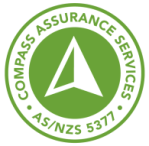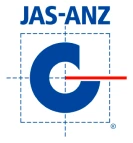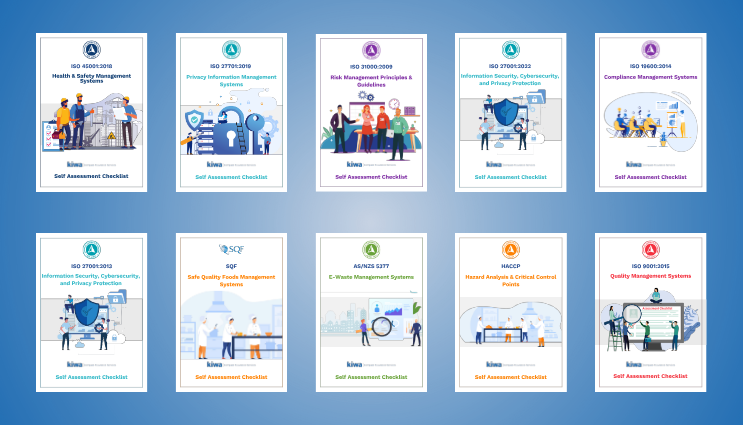


AS/NZS 5377 Certification – E-Waste Management Systems Certification
Want to work with E-Waste within Australia or New Zealand? You need an AS/NZS 5377 Certification.
AS/NZS 5377 E-Waste is the management system standard developed by the Australian Government Department of the Environment and the New Zealand Ministry of Environment. Compass Assurance Services is accredited by JAS-ANZ to certify AS/NZS 5377 Collection, Storage, Transport and Treatment of End-of-Life Electrical and Electronic Equipment, our accreditation number is M5310713AO.
The standard aims to provide a uniform approach to the management of e-waste activities, mostly around safety and environmental concerns. The standard is divided into 5 sections. The first section applies to all businesses, and the remaining 4 sections are specific to different recycling and reuse functions.
Need a Quick Quote?
Request an obligation free quote today, tailored specifically to your business’ certification needs and industry.
Get Your Free ISO Checklist
Training Sessions
Contact Us

What is AS/NZS 5377 E-Waste Management?
AS/NZS 5377 E-Waste is a management system standard developed by the Australian Government Department of the Environment and the New Zealand Ministry of Environment.

Why do I need AS/NZS 5377 E-Waste Certification?
Since 2011, The National Television and Computer Recycling Scheme (NTCRS) has provided Australian householders and small business with access to industry-funded collection and recycling services for televisions and computers.

What are the benefits of AS/NZS 5377 Certification?
Companies often initially seek certification for external reasons such as getting on preferred supplier’s lists, improving company image and responding to customer demands. The benefits of this are obvious – more work.

How can I get certified?
Getting AS/NZS 5377 certification is a lot easier than you might think, We take you through the three step audit process from your initial enquiry to the final certification decision.

AS/NZS 5377 Certification Throughout Australia
Compass Assurance Services have offices and staff located throughout Australia including Brisbane, Melbourne, Perth, Adelaide, and Sydney.
Have you looked at our self assessment checklist yet?
We worked hard so you don’t have to. Our accreditation checklists break down the standard in plain English so you can understand the requirements and what your business needs to do to get certified.


Come along to one of our Workshops
We’ve developed our range of essentials training courses to de-mysitify the accreditation requirements and provide a contextualised understanding of compliance and assurance for your business.
Our experienced trainers are our auditors too and focus on the areas of the standard they see business’s have difficultly with.
LEARN MORE
5 Requirements of AS/NZS 5377 E-Waste Certification
The standard is divided into 5 sections. The first section applies to all businesses, and the remaining 4 sections are specific to different recycling and reuse functions.
Section 1: General Requirements
Section 1 outlines the general requirements of the standard that are applicable to all organisations.
This section provides a framework for identification of legal and other requirements to manage business functions as well as risks related to safety and environment. This section of the standard requires organisations to consider the following:
- The requirement to identify relevant legislation and licencing requirements
- Risk assessment processes and emergency response and identification of training needs
- Records management and data security
- Ensuring requirements for refurbishment of equipment and disposal to landfill are met.
Section 2: Collection & Storage
Section 2 of the standard covers requirements for collection and storage facilities.
This section applies to organisations who are positioning themselves in the market as a place where end of life electrical equipment will be collected and/or stored for the purpose of transport to a facility for material recovery or processing. Considerations in this section of the standard include:
- Signage and access
- Security of the storage area
- The ability to segregate waste
- Processes for ensuring the storage area adequately protects waste (to prevent discharge, leakage or combustion)
- Systems for handling electronic and electrical waste that is dumped at the facility
Section 3: Recover Reuse from End-of-life
Section 3 of the standard contains requirements for organisations who recover for reuse from end-of-life electrical and electronic equipment.
This applies to businesses who are recovering assemblies or components from end of life electrical and electronic equipment. It should be noted however that repair, refurbishment and remarketing of whole equipment is outside of the scope of the standard. Areas to consider include:
- Identification and handling of materials identified for re-use
- Processes for harvesting assemblies and parts (including a documented procedure for the process)
- Systems for managing waste generated from parts that are not re-used
Section 4: Transportation
Section 4 articulates requirements for transportation.
This section applies to organisations who transport electrical and electronic equipment for recovery and recycling or disposal, and applies whether transportation is intrastate, interstate or for export. This section of the standard requires that organisations consider:
- Ensuring minimal vehicle movements, and that waste is not stockpiled
- Ensuring staff are trained and appropriate equipment is used
- Maintaining documentation where waste is classified as traceable.
Section 5: Process & Separation of Components
Section 5 applies to organisations who process end of life electrical and electronic equipment in order to separate out the components.
This can be either manually, mechanically, metallurgically or chemically; with the result that hazardous substances, preparations and components are an identifiable stream.
Table 1 Annex B of the standard provides guidance on processing methods and disposal.
Further requirements of this section of the standard include that waste remains traceable, with documentation to the point of final disposal be maintained.
Want to speak to someone?
Contact Us
Contact us and speak to one of our helpful team about your ISO certification needs. We can offer certification to smaller, niche standards and to other non-accredited (non ISO) standards as well.
Request a Quote
Request an obligation free quote today, tailored specifically to your business’ certification needs and industry.

